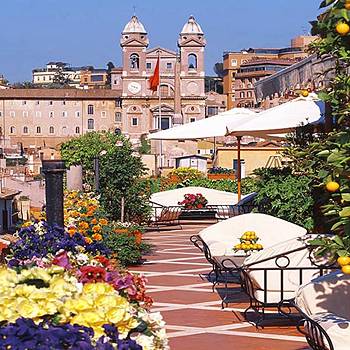

Mohamed Ali Ibrahim (Ali) was born in Cairo on 23 November 1950, to Mr. Ibrahim and Mrs. Fatma. The two families merged their wealth by marriage in 1949, and raised Mohamed in the province of Beheira, his father’s home town. He moved back with his parents to Cairo where he continued and finished his education her only son when he turned four. His father worked as an Undersecretary at the Ministry of Social Affairs for three consecutive ministers. In 1972, he graduated from Al Alson at Ein Shams University and then obtained an MA in Mass Communications from the AUC in 1974. He has a longstanding wife of 25 years and two children he dotes on; a daughter who’s 22 and a son, 16.
The journalists amongst themselves call their editors-in-chief ‘el-Rayess’ (the Boss) so I interviewed one of the top Egyptian editors-in-chief to know more about him and learn what’s going on these days in Egyptian journalism…
Q. What traits or attributes did you inherit from your parents?
A. Generosity from my father and straightforwardness from my mother.
Q. Any reporters/journalists or writers, in the family?
Q. Were you interested in writing or journalism as a child?
Q. When did you start professionally as a full-fledged writer?
A. In 1976.
Q. Who are your favorite writers and journalists, then and now?
Q. Who’s your favourite journalist nowadays?
Q. Why is he your favourite?
Q. Do you write all your articles by hand, despite your latest tech PC?
A. Yes, because previously I wrote for a long time in English, by hand. It comes faster to me that way. I know how to type a bit in English, but not in Arabic! So, I write my Arabic articles by hand too. I think I rather enjoy writing by hand.
Q. You used to write columns when you were at the Egyptian Gazette and write columns now. Could you clarify?
Q. Like all Sagittarians, you’re an extrovert and love traveling. What countries have you been to, job-related and on your own?
A. I traveled to 71 countries all over the world. I paid for some of the trips that were not job-related. The countries I visited are almost from all the five continents. If you have place, I will give you a list!
Q. What’s your favorite country?
A. Ireland. I have fond memories there. (With skirts....!)
Q. As for your love of Ireland, how would you like Egypt to become another Ireland?
Q. As an Egyptian citizen, what’s your dream, hopes and aspiration for Egypt?
A. I wish it would become like India. It’s a very populous country…. (It’s the second most populous country in the world.) On the other hand, they are democratic and very progressive. They managed to overcome all their socio-economic problems.
Q. I see. India is also very advanced in technology…
Q. Who is or was your favorite Indian leader?
A. Indira Ghandi.
Q. Then what’s your passion for Oman that you mentioned so often in your Arabic articles?
A. I like Oman too. The people there are very generous and kind; a lot like the Egyptians. I worked there for two years. It’s a rich country and high in technology.
Q. You were editor-in-chief of the Egyptian Gazette from 1991 till July 2005. How were you appointed as editor-in-chief of the Egyptian Gazette?
A. As I was working in the Dar Al-Tahrir Publishing House writing for the El-Messa & Gomhuria newspapers, and have good English language background, when the editor-in-chief of the Egyptian Gazette Mohamed El-Ezaby retired, I was chosen and promoted to his post.
Q. Do you consider yourself lucky, or motivated?
Q. Ousting of editors and chairmen: the move came in July 2005 from at least two courts who issued orders stripping existing newspaper editors and chairmen of their posts for having worked past the mandatory retirement age of 65 for journalists. Is that correct? Was the motive political?
A. No political motive. Most of them were around 69 or over 70 years old. Retirement age for journalists is 65. (For the majority of other jobs in Egypt, retirement age is 60.)
Q. Did the President of the Shura Council (the nation’s Upper House of Parliament) Mr. Safwat El-Sherif, orchestrate this move? Why?
Q. He was formerly the Minister of Information for twenty-two years…
A. Yes, but even now as the Head Speaker for the Shura Council, one cannot say that the move was mainly from him; it was orchestrated by many other ‘bodies’.
Q. Was the move also due reportedly to ‘corruption’.
A. I know nothing about that.
Q. Can this happen again, with another pretext besides passing the age limit? Do you feel safe?
A. They (the government) can do whatever they want and at any time. What’s wrong with that? ‘Change’ is good! ‘Change’ is for the better.
Q. What do you think of the government during the last twenty years as in constitutional amendments, policy changes, press freedom, libel and/or prison threats to liberal journalists, etc.?
A. Our government is democratic and the Prime Minister Ahmed Nazif is educated and intelligent, so I think we are on the right track. As for freedom of the press, as I already mentioned we have more freedom than before, as long as one does not insult or libel.
Q. How many employees are there in the press and media?
A. In the Gomhuria establishment there are 4,500 employees including labourers, engineers, technicians, journalists, reporters, administrative and financial staff, and so forth. In all the newspapers of Egypt, there are more than 50,000 personnel. This includes the national newspapers, such as the Ahram, Akhbar, Gomhuria, ‘Rosa’ (Rose El-Youssef) and 6th October magazines, El-Mussawar, and so forth. There are writers with contracts and writers as journalists; we work as journalists and at the same time we can write! As for the Gomhuria newspaper, there are about 15 to 20 journalists or writers, with regular columns.
Q. What about the gossip in advertising, and how you take very high ‘incentives’?
Q. Is it a general rule that the chairman, editor-in-chief, advertisers and the advertising department, take more ‘commission’ than the rest of the writers and employees?
A. Not in my establishment.
Q. I read that Dar El-Tahrir is indebted LE 375 million to Banque du Caire and the National Bank of Egypt.
A. Where did you get that number? The debt for the Dar El-Tahrir Publishing House (Gomhuria) is around LE 500 million, including debts to the banks you mentioned and other banks!
Q. L.E. 500 million?
A. Apart from the construction of the building, the companies within the complex are indebted as well: the company for advertising (‘El-Ealanat El-Masria’), the company for distribution & circulation (‘El-Tawzee’a El-Mutahida’), ‘The Eastern Company’, for printing and Dar El-Gomhuria (or El-Tahrir Publishing House) that combines all the publications, which amounts to about eight newspapers and magazines. By the way, there’s a LE. 7 billion pending debt for all the newspaper establishments in Egypt: Ahram, Akhbar, Akhbar El-Yom, Al-Gomhuria, Rose El-Youssef, Dar El-Hilal, Dar El-Maaref, El-Ta’awen, Dar El-Shaab – I think that about rounds them up.
Q. Yes, but it’s all really one, in the end. And despite the debts, when you took over you renovated your office very lavishly. I see that it is very, very posh indeed ... I like the new regal colour scheme; off-white, cream, beige, brick, crimson and gold, with the huge palatial crystal chandeliers highlighting your good taste. You pointed out some of Mr. Samir Ragab’s old navy blue leather furniture, which are sort of pushed under the stairs that leads to your private 9th floor office-bedroom. By the way, will the debts be dropped, or paid?
Q. If you don’t know, then who does?
A. I’m not the government. This is according to what the Shura Council decides.
Q. Mr. Samir Ragab still writes his columns, but in July 2005 his job was divided for two people; yourself and the Dar El-Tahrir Publishing Chairman, Mr. Mohamed Abu El-Hadeed, who writes occasionally as well. However, you seem to be the decision-maker.
Q. What was your salary at The Egyptian Gazette and now in the Gomhuria newspaper? I read some exaggerations about your salaries, as editors-in-chief. I read that you are paid a quarter of a million, or at the very least LE.10000 as a monthly salary. Is that correct? You mentioned the exact amount a few months ago…in your Arabic daily newspaper Al Gomhuria, but I forgot. Could you tickle my memory?
Q. There are current rumors about the privatization of all newspapers in Egypt. Does this elate or worry you? What’s the low-down on this rumour? They say that privatization is a solution to corruption. In fact, the anti-corruption campaign promoted this idea…before you took over, of course.
A. I’m not worried at all because I know there will be no privatization.
Q. You don’t want this to happen, though?
A. That’s not correct. I don’t mind if it would be for the good of the establishments, but if that means they will close down certain publications, or layoff personnel in the process just to save money, then I don’t want privatization.
Q. Journalist Galal Aref of the Akhbar El-Yom newspaper is now the new Chairman of the Press Syndicate (or ‘Head of the Journalists Union’) and was chosen over Ibrahim Nafie. Does he still write, and where?
A. Yes, he replaced Ibrahim Nafie and he writes also in the Akhbar El-Yom newspaper.
Q. Who chose Mr. Ramadan Abel-Kader, as your replacement in The Egyptian Gazette?
A. The Shura Council.
Q. What time and days do you go to your office?
A. I go around 10 o’clock, more or less, every day of the week except Fridays, unless there is an emergency meeting.
Q. Is this job stressful, and what price did you pay for it, if at all?
A. Yes, definitely stressful. My health pays the price! I used to walk, but I stopped walking. I used to exercise, swim and play tennis, and now I have no time for that. So, I will get afflicted with all types of diseases related to stress, such as diabetes, high blood pressure and so forth.
Q. Which you are inflicted with, as I read from your own words in your recent columns. You can still do all that, on Fridays?
Q. You had an ‘open door’ policy at the Egyptian Gazette. Is it now difficult to meet you?
A. I’m still accessible and have the same ‘open door’ policy.
Q. Could you describe your first impression of President Hosni Mubarak? And, when did you meet? Did you have a tête-à-tête with him?
A. I was impressed by his personality, his simplicity, his directness and frankness. I met him once before the group of editors boarded his private plane on his European Tour last year, but we had no private tête-à-tête. My first conversation was published in all the newspapers in May 2006.
Q. I heard that the President’s son, Mr. Gamal Mubarak, will marry the beautiful Khadiga on the 4th of May, President Hosni Mubarak’s birthday. Are you invited?
A. I don’t know yet. Maybe all the editors-in-chief are.
Q. Could you describe the President’s private plane? Was it different?
A. The same, more or less, like any other plane, except that it is divided in two; one half for the ministers and another half for the press or editors-in-chief, TV media and the presidential staff.
Q. Special stewardesses?
Q. Are you a ‘spokesperson’ for the government?
A. No.
Q. How far, free or effective has journalism reached since you started your career, and where do you think it is taking us?
A. We have more freedom of expression than before.
Q. And...how does the government reflect and affect in the end in the media and newspapers? Is there really 'freedom of the press'...or are we being brainwashed into believing that?
Q. After the President, who are the most fascinating people you have met or interviewed?
A. Quite a few, including (Chancellor) Dr. Helmut Kohl and Gerhard Schröder of Germany; Altal Bihari Vajpayee and former Prime Minister Benazir Bhuttu of India, and ousted Prime Minister of Pakistan Muhammad Nawaz Sharif.
Q. Who’s the most charismatic and most intelligent Leader of State, in your opinion?
A. The most charismatic and the most intelligent leader in the world, is President Hosni Mubarak.
Q. What about art...what celebrities did you personally interview, in or out of Egypt?
Q. Your organization makes at least two multi-million concerts or shows per year –who arranges them and chooses the performers, and do you take the revenues? Is it for charity, and is it worth it?
Q. Who’s the highest-paid artist or performer?
A. I think it’s (singer) Amr Diab.
Q. But you didn’t have Amr Diab in your concerts. You had the drop-dead gorgeous, voluptuous entertainer (supposedly singer) Lebanese Haifa Wahby and I think also the adorable beautiful Lebanese singer (but whose voice is as good as her looks) Nancy Aagram. Do you know how much were they individually paid?
A. I don’t know really. The PR department handles this.
Q. What’s your favorite music and who are your favorite singers? Do you attend their shows?
Q. By the way, I heard that last year you presented a satellite TV talk show for a few months, then you suddenly left. The show is still on TV, and has been and is still being presented by Mona El-Shazly. Why did you leave? Did they choose her over you? (Maybe because she is
A. I like to watch tennis and football, and I’m ‘ahlawy’ - (National Football Team fan.) I used to play tennis 15 years ago and still swim in the summers when I go to the beach or pools in or around Cairo.
Q. Are you a sports/social club member?
Q. I read that you own some land somewhere. Is it a farm? Do you breed animals? Were any members of your family farmers and what do you cultivate there?
A. My wife’s family and I own jointly about 100 fedans in El-Beheira province.
Q. Favourite food?
A. Cheese, sea food, steak, salads and fruit.
Q. Far from work, who do you trust the most?
Q. Who are your true friends?
Q. Do you have any rivals at work, or enemies?
A. No, I don’t have any enemies. As for work, I have no rivals; I’m very strong!
Q. You are very self-confident. So, as the Gomhuria newspaper is considered the 3rd in line, after the Ahram and Akhbar newspapers respectively, what are you doing, if at all, to become the first?
A. Al Gomhuria was never the third in line; it is actually the first or second in sales and circulation. Since I took over, sales have increased a lot, which means there are more readers now and more revenues. That’s a good start. Maybe partly in thanks to my new writers along with the old; the sales department for the overall distribution in and out of Egypt; the public relations department for their promotional ideas and sales gimmicks (such as attaching free CDs to some of the weekly magazines) - along with organizing our Ramadan Iftars and the bi-annual concerts, and so forth.
Q. What are your personal fears? Joys?
A. I have no fears. My personal joy is to see my children happy.
Q. Nothing makes you cry?
A. Nothing.
Q. In your mind, what’s your worst and best traits?
A. I think that I’m sometimes a bit hot-tempered. My best…I think I’m kind.
Q. What’s your motto in life?
Q. You are very ambitious, so what are your future goals?
A. No, I’m not very ambitious. My goals in life: to have good health, happiness and career satisfaction. That’s very important to me.
Q. Do you think you got all what you wanted from life, or more than you expected?
Q. There’s a rumour that you’re quite a ladies’ man and appreciate the beauty of a woman. What’s a beautiful woman, in your opinion?
Q. What about beauty in nature? What’s your favourite scenery?
A. I like sunsets.
Q. If you were not a journalist or writer, what would you have liked to have been?
Q. Finally, who would you have liked to have met, but didn’t get the chance to, and why?
Q. As for women? Who would you like to meet, or have met?
A. Ava Gardner and Meryl Streep. Meryl Streep because she has a HUGE brain. (What bullshit!Huge brain?!! How does HE know that? They never met. Ava Garner died long ago. As forMeryl Streep
A. Ahmed Rizk makes me laugh. And, Adel Iman.
‘Did you use your Jacuzzi?!’
He smiled his kootchie-koo smile, and answered,
‘No. I have a phobia of getting electrified in the water!’
So, it wasn’t a rumor! And, I caught him at ONE thing he feared! I had a tour of the place and asked to see the Jacuzzi. Phobia or not, I think he wouldn’t use it anyway; it somehow seemed too small for him…
H.N.
























































































































